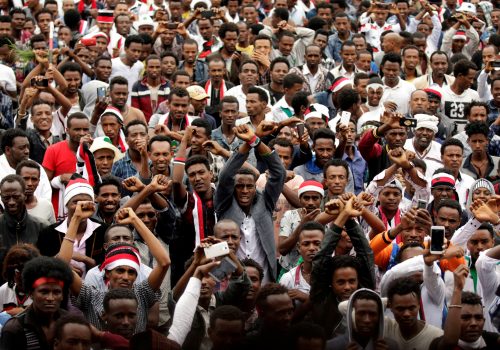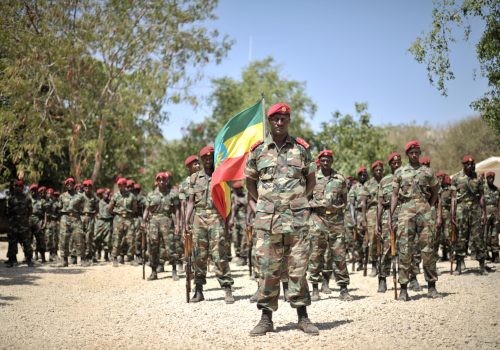FAST THINKING: Get up to speed on the crisis in Ethiopia
GET UP TO SPEED
A fast-developing crisis in Ethiopia has the crucial US ally edging closer to all-out war, just two years after Prime Minister Abiy Ahmed took office promising democratic reforms and a year after he won the Nobel Peace Prize. So what happened? Today we’re turning to Cameron Hudson, an expert on the region and former US diplomat and intelligence officer, for a look behind the headlines.
TODAY’S EXPERT REACTION COURTESY OF
- Cameron Hudson: Former director for African affairs at the National Security Council and senior fellow with the Atlantic Council’s Africa Center
The backstory
Abiy’s governing coalition has from the start faced resistance from the Tigray People’s Liberation Front (TPLF), the core element of the former ruling party based in the country’s north. Months of tensions boiled over after an alleged TPLF attack on government forces. Abiy has dispatched troops to the northern region and hundreds of people have been killed in the fighting. The prime minister has so far refused calls for international mediation, calling the conflict an “internal law and order operation.”
What’s Abiy up to?
- “He’s trying to reform the Ethiopian state. He came to power in 2018 with a popular mandate to break with decades of authoritarian rule and ethnic politics. But his vision of a pan-Ethiopian political and social movement has been stymied by the TPLF.”
- “Abiy has proven to be a perplexing figure. A PhD in peace and conflict resolution, his image as prime minister was made by early moves to make peace with neighboring Eritrea and the release of his own domestic political prisoners. But he rose to positions of authority through military intelligence under an authoritarian system.”
Did the Nobel Committee get Abiy wrong?
- “The prize was premature. In retrospect it represented more of a celebration of Ethiopia’s move away from authoritarianism and the prospects of a democratic transition and stable Horn of Africa than the fully realized product of his vision.”
What should we make of the TPLF?
- “There should be no love lost for the TPLF. Under their long rule, Ethiopian media was censored, political opponents were jailed, and a vast security state kept the country’s 110 million population largely in check. But they also present legitimate grievances with respect to Abiy’s reform agenda, which are shared in part by other ethnic groups.”
- “Unlike those other groups, the TPLF has the military hardware and the experience of as many as 250,000 battle-hardened troops to not only present an alternative political vision, but aggressively pursue it.”
- “While Abiy came to power through a popular protest movement, he does not govern with an electoral mandate. When he canceled national elections earlier this year due to the COVID pandemic—elections that would have legitimized and formalized not only his rule but his broader reform agenda—he became, in the eyes of the Tigrayan leaders, an illegitimate leader serving in violation of the constitution. In response, this fall, Tigray held its own regional elections, contravening federal authorities, and thus calling into question their own legitimacy in the eyes of Abiy’s government.”
What role does Ethiopia play in regional stability?
- “Ethiopia has been the lynchpin of security in the Horn of Africa region for the better part of two decades—whether contributing peacekeepers under UN and African Union mandates to conflict zones around the continent; partnering with the US on counterterror operations, most notably in neighboring Somalia; using its political leaders to intervene and mediate in hot conflicts in places like Sudan and South Sudan; or simply playing host to the African Union headquarters. Reversing this trend—or worse, seeing Ethiopia become a net exporter of violence and instability—will most assuredly have a devastating effect.”
What should we watch to understand where the conflict is headed next?
- “First, the degree to which ethnicity is being weaponized. Underpinning this entire conflict is Ethiopia’s troubled history of managing ethnic diversity. If the conflict spreads to Ethiopia’s other ethnic regions and we see score-settling based on ethnic divides, many are cautioning that we could quickly see the dissolution of the Ethiopian state, akin to the breakup of Yugoslavia.”
- “Second, many regional actors will have a stake in the outcome of an Ethiopian civil war—including Egypt, which has been in heated negotiations with Abiy over the use of Nile waters, and Eritrea, which fought a long border war against mostly Tigrayan troops and is now allied with Abiy. In a battle of near-equals, outside actors could be the difference-maker.”
What can a Biden administration do?
“This conflict is a reminder that Ethiopia, along with Nigeria, Kenya, and South Africa, are the continent’s ‘too big to fail’ countries. Considerable diplomatic effort needs to be put into repairing the Trump administration’s ill-advised record of non-engagement in the region so that we once again have influence and credibility. Biden will face calls to appoint a first-ever Horn of Africa envoy, which makes increasing sense. The US needs a coherent strategy for this region and the capacity to carry it out.”
Further reading
Fri, Nov 13, 2020
Calls for negotiation are driving Ethiopia deeper into war
AfricaSource By Bronwyn Bruton
Ethiopian Prime Minister Abiy Ahmed, who won the Nobel Prize for his peacemaking with Eritrea, has confounded allies by resisting all attempts to dampen the ongoing military confrontation with a powerful northern insurgent group, the Tigray People’s Liberation Front (TPLF). The TPLF effectively controlled the Ethiopian government from 1991 until February 2018, when it was driven […]
Wed, Nov 11, 2020
Experts react: Understanding the conflict in Tigray
AfricaSource By
As conflict breaks out in Ethiopia's Tigray region, Africa Center experts react and analyze what this means for the country and its neighbors.
Fri, Oct 16, 2020
The US government makes its big push for investment in Africa
New Atlanticist By David A. Wemer
Buoyed by bipartisan commitment and a new government agency, the United States has taken new and significant steps to help drive investment in Africa, strengthen the region’s dynamic economies, create lucrative opportunities for US and African businesses, and advance US foreign-policy goals in the region.
Image: An Ethiopian woman who fled war in Tigray region carries a jerrycan of water as she walks at the Umrakoba camp on the Sudan-Ethiopia border in Al-Qadarif state, Sudan November 19, 2020. REUTERS/Mohamed Nureldin Abdallah


